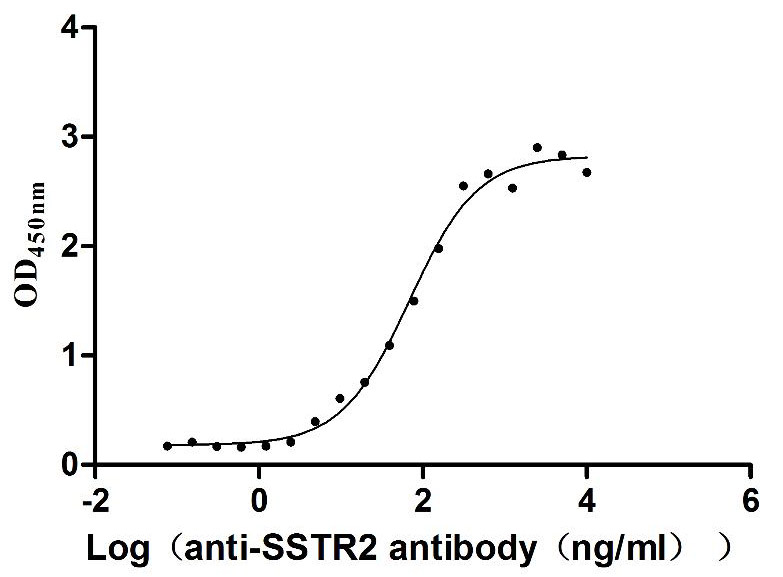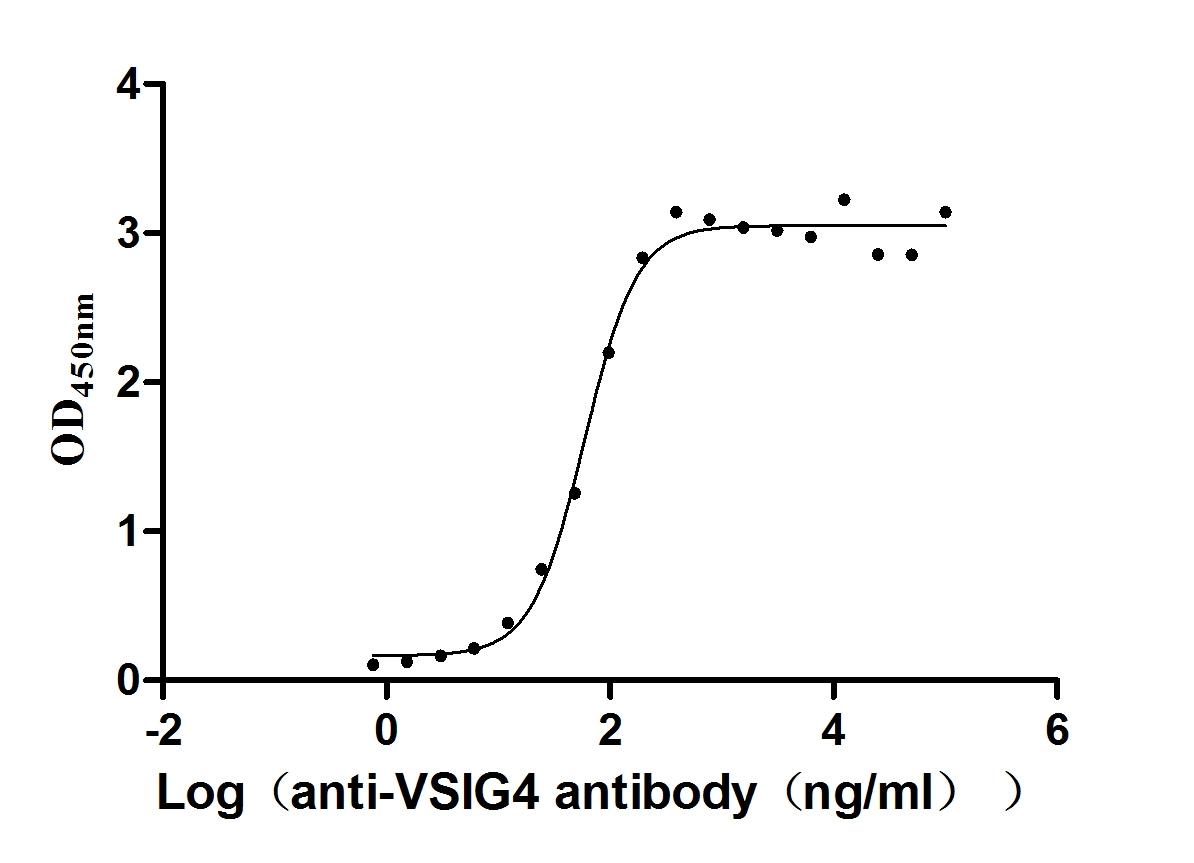Recombinant Human Cadherin-23 (CDH23), partial
-
中文名稱:Recombinant Human Cadherin-23(CDH23) ,partial,Yeast
-
貨號:CSB-YP872438HU
-
規(guī)格:
-
來源:Yeast
-
其他:
-
中文名稱:Recombinant Human Cadherin-23(CDH23) ,partial,Yeast
-
貨號:CSB-EP872438HU
-
規(guī)格:
-
來源:E.coli
-
其他:
-
中文名稱:Recombinant Human Cadherin-23(CDH23) ,partial,Yeast
-
貨號:CSB-EP872438HU-B
-
規(guī)格:
-
來源:E.coli
-
共軛:Avi-tag Biotinylated
E. coli biotin ligase (BirA) is highly specific in covalently attaching biotin to the 15 amino acid AviTag peptide. This recombinant protein was biotinylated in vivo by AviTag-BirA technology, which method is BriA catalyzes amide linkage between the biotin and the specific lysine of the AviTag.
-
其他:
-
中文名稱:Recombinant Human Cadherin-23(CDH23) ,partial,Yeast
-
貨號:CSB-BP872438HU
-
規(guī)格:
-
來源:Baculovirus
-
其他:
-
中文名稱:Recombinant Human Cadherin-23(CDH23) ,partial,Yeast
-
貨號:CSB-MP872438HU
-
規(guī)格:
-
來源:Mammalian cell
-
其他:
產(chǎn)品詳情
-
純度:>85% (SDS-PAGE)
-
基因名:CDH23
-
Uniprot No.:
-
別名:CDH23; KIAA1774; KIAA1812; UNQ1894/PRO4340Cadherin-23; Otocadherin
-
種屬:Homo sapiens (Human)
-
蛋白長度:Partial
-
蛋白標(biāo)簽:Tag?type?will?be?determined?during?the?manufacturing?process.
The tag type will be determined during production process. If you have specified tag type, please tell us and we will develop the specified tag preferentially. -
產(chǎn)品提供形式:Lyophilized powder
Note: We will preferentially ship the format that we have in stock, however, if you have any special requirement for the format, please remark your requirement when placing the order, we will prepare according to your demand. -
復(fù)溶:We recommend that this vial be briefly centrifuged prior to opening to bring the contents to the bottom. Please reconstitute protein in deionized sterile water to a concentration of 0.1-1.0 mg/mL.We recommend to add 5-50% of glycerol (final concentration) and aliquot for long-term storage at -20℃/-80℃. Our default final concentration of glycerol is 50%. Customers could use it as reference.
-
儲存條件:Store at -20°C/-80°C upon receipt, aliquoting is necessary for mutiple use. Avoid repeated freeze-thaw cycles.
-
保質(zhì)期:The shelf life is related to many factors, storage state, buffer ingredients, storage temperature and the stability of the protein itself.
Generally, the shelf life of liquid form is 6 months at -20°C/-80°C. The shelf life of lyophilized form is 12 months at -20°C/-80°C. -
貨期:Delivery time may differ from different purchasing way or location, please kindly consult your local distributors for specific delivery time.Note: All of our proteins are default shipped with normal blue ice packs, if you request to ship with dry ice, please communicate with us in advance and extra fees will be charged.
-
注意事項(xiàng):Repeated freezing and thawing is not recommended. Store working aliquots at 4°C for up to one week.
-
Datasheet :Please contact us to get it.
相關(guān)產(chǎn)品
靶點(diǎn)詳情
-
功能:Cadherins are calcium-dependent cell adhesion proteins. They preferentially interact with themselves in a homophilic manner in connecting cells. CDH23 is required for establishing and/or maintaining the proper organization of the stereocilia bundle of hair cells in the cochlea and the vestibule during late embryonic/early postnatal development. It is part of the functional network formed by USH1C, USH1G, CDH23 and MYO7A that mediates mechanotransduction in cochlear hair cells. Required for normal hearing.
-
基因功能參考文獻(xiàn):
- We have identified CDH23 mutations as a genetic risk factor for both familial and sporadic pituitary adenoma. PMID: 28413019
- an important contribution of CDH23 mutations to poslingual Sensorineural Hearing Loss PMID: 27792758
- A new diagnosis of sector retinitis pigmentosa was found to have two novel compound heterozygous mutations in CDH23, including one missense (c.8530C > A; p.Pro2844Thr) and one splice-site (c.5820 + 5G > A) mutation. PMID: 26878454
- Four (3.1 %) of 128 children carried two CDH23 mutant alleles, and SLC26A4 and GJB2 accounted for 18.0 and 17.2 %, respectively and showed profound nonsyndromic sensorineural hearing loss with minimal residual hearing. PMID: 26264712
- The results revealed that CDH23 mutations are highly prevalent in patients with congenital high-frequency sporadic or recessively inherited hearing loss PMID: 25963016
- Description of the spectrum of mutations in CDH23 in 374 families with autosomal recessive, non-syndromic hearing loss from India. PMID: 24416283
- The results of this study confirm that CDH23 genetic variant may modify the susceptibility to noise-induced hearing loss development in humans PMID: 24448297
- mutations in the CDH23 gene are one of the most important causes of non-syndromic hearing loss in East Asians. PMID: 24767429
- Hearing loss was found to co-segregate with locus-specific STR markers for CDH23 in 1 Pakistani family. PMID: 23770805
- mutations of the CDH23 gene are an important cause of non-syndromic hearing loss. PMID: 22899989
- Large protein assemblies formed by multivalent interactions between cadherin23 and harmonin suggest a stable anchorage structure at the tip link of stereocilia PMID: 22879593
- Despite that the Ahl allele of Cdh23 had been implicated with ARHI in mice, we found no positive association of the CDH23 tag SNP in intron 7 with ARHI in Han Chinese. PMID: 22581638
- cadherin-23 is up-regulated in breast cancer tissue versus normal tissue and we propose that cadherin-23-mediated heterotypic adhesion between invading tumor cells and stromal fibroblasts may play a role in the metastatic cascade. PMID: 22413011
- One non-syndromic deafness allele (DFNB12) in trans configuration to an Usher syndrome allele (USH1D) of CDH23 preserves vision and balance in deaf individuals, indicating that the DFNB12 allele is phenotypically dominant to an USH1D allele. PMID: 21940737
- Five mutations (three in MYO7A and two in CDH23) were identified in four of five unrelated patients with Usher syndrome type 1. PMID: 20844544
- individuals with the rs1227049 CC genotype, rs3802711 TT genotype and GG genotype in the terminal position of exon 7 of CDH23 might be more susceptible to noise induced hearing loss. PMID: 16598924
- determined the structure of the extracellular cadherin (EC)1-EC2 domains of cadherin 23, which binds to protocadherin 15 to form tip links of mechanosensory hair cells. PMID: 20498078
- Describes cloning of human and mouse isoforms B1, B2, C1 and C2. PMID: 15882574
- Three novel CDH23 mutations have been identified in patients with Usher syndrome type 1D. PMID: 11857743
- patients with mutations in CDH23 display a wide range of hearing loss and retinitis pigmentosa phenotypes PMID: 12075507
- the shaping of the hair bundle relies on a functional unit composed of myosin VIIa, harmonin b and cadherin 23 that is essential to ensure the cohesion of the stereocilia PMID: 12485990
- CDH23 and PCDH15 play an essential long-term role in maintaining the normal organization of the stereocilia bundle. PMID: 15537665
- Missense mutations in CDH23 have been associated with presbycusis and nonsyndromic prelingual hearing loss (DFNB12), whereas null alleles cause the majority of Usher syndrome (Usher 1D). PMID: 16550584
- Disease causing mutations were identified in 31 of the 34 families referred: 17 in MYO7A, 6 in CDH23, 6 in PCDH15, and 2 in USH1C. PMID: 16679490
- analysis of CDH23 mutations in Japanese patients with non-syndromic hearing loss PMID: 17850630
- Four missense mutations have been described in USH1 patients in a homozygous state. PMID: 18273900
- Molecular genetic analysis was performed in 11 patients and pathogenic mutations were identified in all cases: (mutation in cadherin 23 gene in 6 cases). Two new mutations in the CDH23 gene never reported were found. PMID: 18323324
- 35 SNP-s were identified. The nonsynonymous SNPs localized to the part of the gene encoding the extracellular domain of Cadherin 23, (ectodomains 5, 13, 14, 15, 16, 17, 19, and 22). One amino acid change occurred at a conserved position in ectodomain 5. PMID: 18348277
- Screening revealed that in Japanese, mutation in CDH23 is the major causes of hearing loss. PMID: 18368581
- Based on our results it is estimated that about 20% of patients with Usher syndrome type I have CDH23 mutations. PMID: 18429043
- The structures of the harmonin N-domain alone and in complex with the cadherin 23 internal peptide fragment uncovered the detailed binding mechanism of this interaction between harmonin and cadherin 23. PMID: 19297620
- Observational study of gene-disease association and genetic testing. (HuGE Navigator) PMID: 19683999
- the apparent occurrence of an unusual TG 3' splice site in intron 11 is discussed PMID: 17672918
顯示更多
收起更多
-
相關(guān)疾?。?/div>Usher syndrome 1D (USH1D); Usher syndrome 1D/F (USH1DF); Deafness, autosomal recessive, 12 (DFNB12); Pituitary adenoma 5, multiple types (PITA5)亞細(xì)胞定位:Cell membrane; Single-pass type I membrane protein.組織特異性:Particularly strong expression in the retina. Found also in the cochlea.數(shù)據(jù)庫鏈接:
Most popular with customers
-
Recombinant Human Glypican-3 (GPC3) (G537R), partial (Active)
Express system: Mammalian cell
Species: Homo sapiens (Human)
-
Recombinant Macaca fascicularis Delta-like protein 3 (DLL3), partial (Active)
Express system: Mammalian cell
Species: Macaca fascicularis (Crab-eating macaque) (Cynomolgus monkey)
-
Recombinant Rat Intestinal-type alkaline phosphatase 1 (Alpi) (Active)
Express system: Mammalian cell
Species: Rattus norvegicus (Rat)
-
Recombinant Human Somatostatin receptor type 2 (SSTR2)-VLPs (Active)
Express system: Mammalian cell
Species: Homo sapiens (Human)
-
Recombinant Human V-set and immunoglobulin domain-containing protein 4 (VSIG4), partial (Active)
Express system: Mammalian cell
Species: Homo sapiens (Human)
-
Recombinant Macaca fascicularis lymphocyte antigen 6 family member G6D (LY6G6D) (Active)
Express system: Yeast
Species: Macaca fascicularis (Crab-eating macaque) (Cynomolgus monkey)
-
Recombinant Human CUB domain-containing protein 1 (CDCP1), partial (Active)
Express system: Mammalian cell
Species: Homo sapiens (Human)


-AC1.jpg)
















